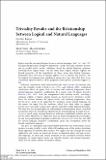Triviality Results and the Relationship between Logical and Natural Languages
Author(s)
Khoo, Justin Donald; Mandelkern, Matthew
DownloadAccepted version (260.8Kb)
Terms of use
Metadata
Show full item recordAbstract
Inquiry into the meaning of logical terms in natural language (‘and’, ‘or’, ‘not’, ‘if’) has generally proceeded along two dimensions. On the one hand, semantic theories aim to predict native speaker intuitions about the natural language sentences involving those logical terms. On the other hand, logical theories explore the formal properties of the translations of those terms into formal languages. Sometimes these two lines of inquiry appear to be in tension: for instance, our best logical investigation into conditional connectives may show that there is no conditional operator that has all the properties native speaker intuitions suggest ‘if’ has. Indicative conditionals have famously been the source of one such tension, ever since the triviality proofs of both Lewis (1976) and Gibbard (1981) established conclusions which are prima facie in tension with ordinary judgements about natural language indicative conditionals. In a recent series of papers, Branden Fitelson (2013, 2015, 2016) has strengthened both triviality results, revealing a common culprit: a logical schema known as import-export. Fitelson's results focus the tension between the logical results and ordinary judgements, since import-export seems to be supported by intuitions about natural language. In this paper, we argue that the intuitions which have been taken to support import-export are really evidence for a closely related but subtly different principle. We show that the two principles are independent by showing how, given a standard assumption about the conditional operator in the formal language in which import-export is stated, many existing theories of indicative conditionals validate one but not the other. Moreover, we argue that once we clearly distinguish these principles, we can use propositional anaphora to show that import-export is in fact not valid for natural language indicative conditionals (given this assumption about the formal conditional operator). This gives us a principled and independently motivated way of rejecting a crucial premiss in many triviality results, while still making sense of the speaker intuitions which appeared to motivate that premiss. We suggest that this strategy has broad application and teaches an important lesson: in theorizing about the logic of natural language, we must pay careful attention to the translation between formal languages, in which logical results are typically proved, and natural languages, which are the subject matter of semantic theory.
Date issued
2019-04Department
Massachusetts Institute of Technology. Department of Linguistics and PhilosophyJournal
Mind
Publisher
Oxford University Press
Citation
Khoo, Justin and Matthew Mandelkern. "Triviality Results and the Relationship between Logical and Natural Languages." Mind, 128, 510, (April 2019): 485–526 © 2018 Khoo and Mandelkern
Version: Author's final manuscript
ISSN
0026-4423
1460-2113
Keywords
Philosophy